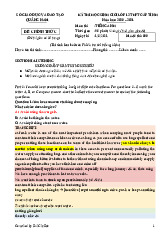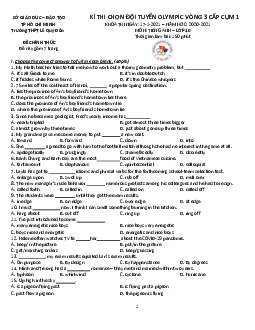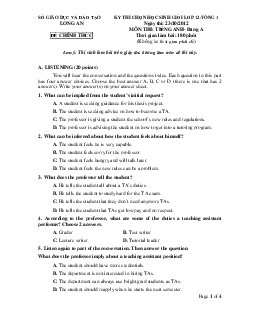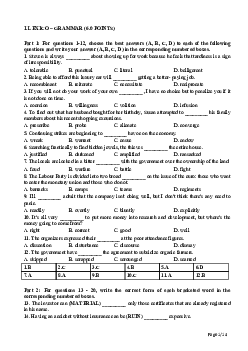








Preview text:
SỞ GD&ĐT NINH BÌNH
ĐỀ THI CHỌN HỌC SINH GIỎI LỚP 12 THPT
Kỳ thi thứ nhất - Năm học 2012–2013 ĐỀ THI CHÍNH THỨC MÔN: TIẾNG ANH
Ngày thi 10 /10/2012
(Thời gian 180, phút không kể thời gian phát đề)
Đề thi gồm 13 câu, trong 09 trang ĐIỂ
HỌ TÊN, CHỮ KÍ CỦA SỐ PHÁCH M BÀI THI GIÁM KHẢO (Do CTHĐ chấm ghi) Giám khảo 1:
......................................................
Bằng số:.......................... Giám khảo 2:
Bằng chữ:....................... ......................................................
(Thí sinh làm bài trực tiếp vào các tờ đề thi)
PART A: LISTENING (3 points):
HƯỚNG DẪN THI NGHE HIỂU:
- Bài nghe gồm 3 phần, thí sinh được nghe 2 lần
- Hướng dẫn làm bài chi tiết cho thí sinh bằng tiếng Anh đã có trong từng phần nghe. I. Section 1: Question 1-9
Question 1-4: Choose the best answer to every question
1. Why would the woman prefer not to live in London? A. It’s too big B. It’s an unfriendly place
B. It’s too far from Liverpool D. It makes her tired
2. What does the woman say about the people she knows in London?
A. She would like to find out more about them
B. She thinks they are uninteresting
C. She thinks they have to work too hard
D. She thinks they hardly show any interest in things
3. The man dislikes village life because
A. You can’t keep any private property
B. People in villages like doing nothing
C. Everybody knows about your private life
D. People in villages never stop talking
4. What does the man say about people in London?
A. They think everyone should be the same as them B. They don’t go out much
C. They try to make friends with you
D. They don’t usually mind how people behave
Question 5-9 Indicate whether the statements are True or False
5. The woman came from Liverpool
6. The woman doesn’t know many people in London
7. The man thought people in London had a very unrealistic idea about country life
8. The man said he had stolen his mother’s money to come to London
9. The man thought people should go out to make friends in London. 1_______ 2__________ 3__________ 4________ 5________ 6_________ 7__________ 8__________ 9________ 1
II. Section 2: Question 10-22
Complete the checklist of career goals with NO MORE THAN THREE WORDS CAREER GOALS Goal 1 To start a career Goal 2 10. ____________ Goal 3 11. ____________ Goal 4 12. ____________
Question 13-14 Complete the sentences with NO MORE THAN THREE WORDS
Applicants should hand in their application forms between (13)___________ and December.
And anyone who wants to apply for the University of Oxford and Cambridge should submit
their form by (14)_______________
Question 15-17: Look at the note and tick if the information is correct according to what you hear. SOURCE OF INFORMATION A. Student magazines B. Rankings C. Reference books D. Government offices E. Prospectuses 15__________ 16___________ 17_________
Question 18-22 Decide whether the statements are True (T) or False (F)
18. The speaker mentioned students should adopt many study methods in the course, such as
brainstorming sessions, field trips, seminars, tutorials and peer review.
19. British universities only offer accommodation for the refreshment
20. According to the speaker, before a student made a decision, he should confirm what kind
of social life the school could offer.
21. If you go to the same university, all the courses would cost the same
22. Students may apply for financial help or scholarships in British universities. 18_______ 19__________ 20__________ 21________ 22________ III. Section 3
Question 23-30: Fill in the missing information with NO MORE THAN THREE WORDS
GREENPEACE SAVE THE CAMPAIGN
The twentieth century has brought many dangers to the world’s largest mammal. Due to
improved (23)_____________ and (24)____________ ships, we might be too late to prevent
whales from becoming (25)__________
There are only 2,000 (26)___________ left, and although the species is (27)_________, there
is no sign that their population is growing.
Only three countries (28)___________, (29)__________and (30)___________
PART B: LEXICO – GRAMMAR (5 points)
IV. Choose the correct answer to each question (1 point)
1. Children can be difficult to teach because of their short attention ____ A. limit B. span C. duration D. time
2. Read that sign, please. It says “English ………here.” A. speaking B. spoken C. should speak D. must speak
3. Few people can do creative work unless they are in the right _____of mind A. frame B. trend C. attitude D. tendency
4. He could provide no documentary evidence to _____ up his claim that dinosaurs had once inhabited these hills. 2 A. back B. fill C. make D. hold
5. Because of road works, traffic is restricted to one ______ in each direction A. lane B. row C. alley D. path
6. They turned down the proposal_____ that it didn’t fulfill their requirement A. by reason B. on the grounds C. as a cause D. allowing
7. _____ the public’s concern about the local environment, this new road scheme will have to be abandoned. A. as regards B. In view of C. In the event of D. However much
8. I hadn’t been riding before and I could barely .............. the horse at first. A. get into B. get out of C. get on D. get off
9. Let’s get to the ……..of the discussion to save time. A. core B. centre C. point D. importance
10. The meeting didn’t _____ until late. A. end up B. break up C. come about D. breakthrough 1_______ 2__________ 3__________ 4________ 5________ 6_______ 7__________ 8__________ 9________ 10________
V. Fill in each blank with a suitable particle or preposition (1 point)
1. What a mess! Sam’s toys haven’t been put ________
2. I must warn you that if you have anything to say, it’ll be taken ________ and may be used in evidence against you.
3. Cheques should be made __________ to Wellington
4. I’m in no hurry. I’ll hang __________here until you are ready.
5. The little boy’s ear stuck__________ from under his school cap.
6. I am Polish ________birth, but I have French nationality.
7. Your plan doesn’t allow __________ changes in the weather.
8. How are you ___________ for work?
9. He muttered a few words and __________ that he left.
10. _________its new conductor, the orchestra has established an international reputation. 1_______ 2__________ 3__________ 4________ 5________ 6_______ 7__________ 8__________ 9________ 10________
VI. There are 10 mistakes in the following passage. Find and correct them (1 point)
In countries where two or more languages are spoken, language is frequently a political
and highly emotive issue. Although Canada is officially bilingual, the French – speaking
province of Quebec introduced the law in 1976 which, in other measures, banned languages
rather than French on commercial signs and restricted admissions to English speaking schools.
In 1988, the supreme court of Canada rules that some in sections of this law were illegal. No
sooner had they done so than thousands of French speakers took to the street protest. Under the
regime of General Franco, a Basque language spoken by about 600,000 people in Spain was
forbidden. So strict was this ban that people using Basque in public could be imprisoned.
Lingual suppression still goes on, but on the whole, governments today are more tolerable of
their minority languages. Nowhere has this reverse of attitudes been more pronounced than in
Wales. Until the twentieth century, Welsh was all along illegal, and its usage was forbidden in
schools and at many places of work. Only a long campaign of protests and vandalism by
Welsh speakers in the 1960s did the British government allow Welsh to become an official language. 1_______________ 2__________ ___ 3__________ _ 4_______________ 5_____________ 6___________ 7_______________ 8_____________ 9___________ 10________ 3
VII. Supply the correct form of the words in the bracket (1 point) SCIENCE 2002
“Science 2002” is the name given to an imaginative development which aims to make (1.
science) ............... and technological developments exciting, even to people who thought
they were (2. interest) ..................... in the subject. As well as its main permanent (3.
exhibit) ................., there is also a changing (4. select) ........................ of educational
programs, such as sessions for schools and colleges, and adults (5. train) .............. course.
Everyone can share the (6. excite) ............ of experiments and discovery. Even (7.
experience) ................. visitors can carry out simple experiments with the help of (8.
special) .............. who are always available to give them all the (9. practice) .............
advice and guidance they need. What’s more, the friendly staff are keen to provide a (10.
welcome) .............. atmosphere. 1_________ 2__________ 3__________ 4________ 5________ 6_________ 7__________ 8__________ 9________ 10________
VIII. Supply the correct form of the verbs (1 point)
Millions of years ago, trees from now vanished forests (1) ______(produce) a sticky
substance that slowly (2)_____(harden) into sparkling rocks. Often, the hardening sap
(3)_____(drip) onto an unlucky grasshopper or beetle, (4)____(encase) it in a premature tomb.
Today, a piece of amber with such content is worth thousands of dollars. However, not long
ago, miners (5)______(toss) out these pieces, (6) ______(believe) them to be flawed and
worthless. The preservation of creatures in amber is amazing. Scientist are able to cut the
amber and (7)_____ (expose) the actual structures of a prehistoric creature’s muscles, eyes,
jaws and nervous systems. Although amber supplies (8)______(decline) in some areas of the
world, it is doubtful that the supplies will be depleted any time soon. New deposits always
(9)____(discover), (10)_____(guarantee) a rich link to the past. 1________ 2__________ 3__________ 4________ 5________ 6________ 7__________ 8__________ 9________ 10________
PART C: READING COMPREHENSION (7 points)
IX. Read the following text and decide which word best fits each blank (3 points) SPORTS PHOTOGRAPHY
Sport as a spectacle and photography as a way of recording action, have developed together.
At the turn of the 20th century, Edward Muybridge was experimenting with photographs of
movement. His pictures of a runner (1)_____ in every history of photography. Another
milestone was when the scientist/photographer Harold Edgerton (2)_____ the limits of
photographic technology with his study of a (3)_____ of milk hitting the surface o of a dish of
milk. Another advance was the development of miniature cameras in the late 1920s which
made it possible for sports photographers to (4)_____ their cumbersome cameras behind.
The significance of television as a transmitter of sport has (5)_____ the prospects of still
photographers. All those people who watch a sports event on TVG, with all its movement and
action, (6)_____ the still image as a reminder of the game. The (7)_____majority of people do
not actually (8)_____ sports events, but see them through the eyes of the media. And when
they look at sports photography, they look not so much for a (9)____of the event as for
emotions and relationships with which they can (10)_____.
Looking back, we can see how (11)_____ sports photography has changed. (12)_____ sports
photographers were as interested in the stories behind the sport as in the sport itself.
Contemporary sports photography (13)_____the glamour of sport, the color and the action. But 4
the best sports photographers today still do more than (14)_____tell the story of the event.
They (15)_____in a single dramatic moment the real emotions of the participants. 1. A. exhibit B. show C. demonstrate D. feature 2. A. extended B. enlarged C. prolonged D. spread 3. A. splash B. drip C. dash D. drop 4. A. put B. leave C. lay D. keep 5. A. assisted B. aided C. benefited D. improved 6. A. choose B. value C. praise D. cheer 7. A. high B. wide C. vast D. main 8. A. attend B. visit C. follow D. meet 9. A. preservation B. store C. record D. mark 10. A. identify B. share C. unite D. join 11. A. highly B. radically C. extremely D. severely 12. A. Early B. First C. Initial D. Primary 13. A. outlines B. signals C. emphasizes D. forms 14. A. alone B. simply C. singly D. only 15. A. seize B. grasp C. capture D. secure 1_______ 2__________ 3__________ 4________ 5________ 6_______ 7__________ 8__________ 9________ 10________ 11_______ 12__________ 13__________ 14________ 15________
X. Read and choose the best answer for the question (2 points)
Biographies of Mohammed are both numerous and unreliable. Non was written in his
lifetime, and all are plagued by legends and embellishments. The best known ones are, based
on the Hadiths, or “traditions”, which are dubious historical value. The Koran may be the only
trustworthy account of the major event of his life.
Mohammed, “the praised One”, founder and prophet of Islam, was born in Mecca in the
years 570. He became an orphan at the age of six and was taken into the care of his uncle,
Abu-Talib. The tribe of Fihr, to which Mohammed’s family belonged, was then on the rise.
(1)They had become the keepers and guardians of the Kaaba in Mecca, a site of pre-Islamic
Arab worship (and now the holiest place in Islam). Their preeminence made it easier for
Mohammed to accomplish his later religious and political conquest. (2)
(3) Mohammed’s early life was spent as a shepherd and caravan attendant. He is thought to
have been quiet man, much given to fasting and prayer. At the age 25 he married a rich, older
widow, Khadeejah.(4) The frequent commercial journey he made after his marriage allowed
him to learn the rudiments of Judaism and Christianity.
When Mohammed was forty years old, he received what he believed to be a call from
the Angel Gabriel, inaugurating his career as a phrophet of Allah and the apostle of Arabia.
His first converts included his wife and daughter, his adopted son Ali, and his slave Zayd.
Mohammed’s attacks on traditional Arab belief provoked ourage and persecution in Mecca,
which drove him to the city of Medina in 622. There he was welcomed as God’s prophet, and
found a growing number of supporters. With their help he conquered several Arab, Jewish and
Christian tribes, of marched triumphantly back to Mecca in 630, destroyed the idols, and
united all the tribes under one religion. He made his last pilgrimage to Mecca with 40,000
followers in 632 and died soon afterward of a fever at the age of 63.
After Mohammed’s death, his successors, the caliphs, aspired to make Islam a world
religion through the conquest of foreign lands. In less than a century they succeeded in taking
Palestine, Syria, Mesopotania, Egypt, North Africa, and southern Spain. In 732 the Muslim
armies were at last defeated at Tours, where their western conquests ended. But they went on
to conquer Oersia, Afghanistan, and part of India. When the Mongols and Turks conquered the
Muslims in the thirteenth century, they adopted Islam as their own religion. 5
The succession of the first three caliphs was the source of a schism within the faith that
persists today. The Sunni, or Orthodox, supported the legitimacy of Abu Bakr, Omar, and
Uthman; the Shiah, or Schismatics, upheld the divine right of Mohammed’s son Ali to be his father’s successor.
1. What is the topic of the passage?
A. The founding and spread of Islam
C. the basis of Islamic belief B. The tribe of Mohammed D. Islam after Mohammed
2. According to the passage, what is the problem with most accounts of Mohammed’s life?
A. They were written by non-Muslims
B. They do not describe his early life
C. They contain some false information D. They have been destroyed
3. The word which refers to A. Tribe B. family C. uncle D. Mohammed
4. Which is the best place for the following sentence?
“Of the six children, only their daughter Fatima survived into adulthood” A. (1) B. (2) C. (3) D(4)
5. The word inaugurating is closest in meaning to A. Improving B. confirming C. beginning D. expanding
6. Which of the following best expresses the essential information in the underlined
sentence in the passage?
A. Mohammed’s supports in Mecca asked him to go to Media to fight against attacks on Arab belief.
B. People in Mecca who became angry about Mohammed’s persecution were forced to go to Media.
C. Mohammed’s traditional Arab belief led to great anger against Mohammed in Mecca and later in Medina
D. Mohammed had to go to Medina after angering people in Mecca with his criticism of older Arab belief.
7. It can be inferred from paragraph 4 that
A. Mohammed’s belief did not differ much from traditional Arab beliefs
B. Before Mohammed, Arabs did not all practice the same religion
C. The Arabs had no religion before Mohammed
D. Media was a more religious city than Mecca
8. According to the reading, what helped Mohammed in his conquests? A. The power of his tribe B. The support of the caliphs
C. His knowledge of Christianity and Judaism
D. The conversation of his wife, daughter and son
9. Which of the following is true?
A. The Muslim armies won their final victory at Tours
B. The Mongols converted to Islam after being conquered by the Muslims
C. The Turks and Mongols became Muslims after their defeat of the Muslim armies.
D. Because of their defeat in 73, the Muslim armies lost most of the territory they had conquered. 10. The Schismatic wanted
A. To make Islam a world religion
B. To choose the caliphs themselves
C. To let Ali take Mohammed’s place as leader
D. To divide Muslims into various sects 6
XI. Read the text and fill in each numbered blank with ONE word. (2 points)
British television is the big success story of post-war years. Little (1) …..than a limited
experiment before the war, it blossomed in (2)………. years following 1945. (3) …..1955,
commercial television began. Today, 90 per cent of population have television in (4) ………homes.
In 1960, a committee of enquiry was (5)………up, (6)…………..the chairmanship of
Sir Harry Pilkington, to investigate the working of broadcasting. The Pilkington Report,
published in 1962, had (7)………to say: “Television has been (8)……….a mirror of society,
but the metaphor, (9) ………….striking, wholly misses the major issue of the responsibility
(10)……….the broadcasting authorities, what is the (11) ……to reflect? It is to reflect the best
or the worst (12)…………us?
One cannot escape the question by saying that it must do both one must ask then
(13)……….. it is to present the best and the worst with complete indifference and
(14)…….comment. Television (15)……..not, and cannot, merely reflect the moral standards of
society. It must affect (16)……….either by changing or by reinforcing them”.
All broadcasting, and television (17)……….., must be ready and anxious to experiment, to
show (18)………..new and unusual, to give a hearing (19)………… dissent. Here,
broadcasting must be worst willing to make mistakes; for if it does not, it will (20)……….no discoveries. 1________ 2__________ 3__________ 4________ 5________ 6________ 7__________ 8__________ 9________ 10________ 11________ 12__________ 13__________ 14________ 15________ 16________ 17__________ 18__________ 19________ 20________
PART D: WRITING ( 5 points)
XII. Writing task 1 (1 point)
Complete the second sentence so that it has a similar meaning to the first sentence,
using the given word. Do not change the word given. You must use between THREE AND
EIGHT WORDS; including the word given Example
Do you mind if I watch you while you paint? (OBJECTION)
Do you have any objection while you pain?
1. It is extremely important that company rules are observed
utmost Observation ____________________________________________importance.
2. Sooner or later, Michael will have to ___ fact that he’s not going to win another major race.
terms Sooner or later, Michael will have to _______________fact that he’s not going to win another major race.
3. The film didn’t live up to our expectations, despite all the publicity.
short The film ________________________our expectations, despite all the publicity
4. Although the Government has introduced new legislation, the transport crisis is growing worse
brought Although new legislation____________________, the transport crisis is growing worse.
5. The plans for the new bypass were not popular with many people.
favour Many people were __________________the new bypass 7
XIII. Writing task 2 (4 points)
The pie chart shows the main reasons why agricultural land become less productive.
The table shows how these causes affected three regions of the world during 1990s.
Summaries the information by selecting and reporting the main features and makes comparison where relevant.
Causes of worldwide land degradation
Causes of land degradation by regions Region
% land degraded by …..
Deforestation Over- cultivation Over-grazing Total land degraded North 0,2 3,3 1,5 5% America Europe 9,8 7,7 5,5 23% Oceania* 1,7 0 11,3 13%
*A large group of islands in the South Pacific including Australia and New Zealand
……………………………………………………………………………….…………………..
……………………………………………………………………………………………………
……………………………………………………………………………………………………
……………………………………………………………………………………………………
……………………………………………………………………………………………………
……………………………………………………………………………….…………………..
……………………………………………………………………………………………………
……………………………………………………………………………………………………
……………………………………………………………………………………………………
……………………………………………………………………………………………………
……………………………………………………………………………….…………………..
…………………………………………………………………………………………………… 8
……………………………………………………………………………………………………
……………………………………………………………………………………………………
……………………………………………………………………………………………………
……………………………………………………………………………….…………………..
……………………………………………………………………………………………………
……………………………………………………………………………………………………
……………………………………………………………………………………………………
……………………………………………………………………………………………………
……………………………………………………………………………….…………………..
……………………………………………………………………………………………………
……………………………………………………………………………………………………
……………………………………………………………………………………………………
……………………………………………………………………………………………………
……………………………………………………………………………….…………………..
……………………………………………………………………………………………………
……………………………………………………………………………………………………
……………………………………………………………………………………………………
……………………………………………………………………………………………………
……………………………………………………………………………….…………………..
……………………………………………………………………………………………………
……………………………………………………………………………………………………
……………………………………………………………………………………………………
……………………………………………………………………………………………………
……………………………………………………………………………….…………………..
……………………………………………………………………………………………………
……………………………………………………………………………………………………
……………………………………………………………………………………………………
…………………………………………………………………………………………………… - The end-- 9




